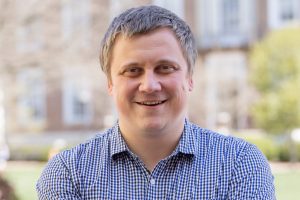
Johns Hopkins University has named Yury Dvorkin, an expert in sustainable energy systems, as one of 16 faculty members in the inaugural cohort of Provost’s Fellows for Public Engagement. The fellows were selected from 135 university applicants and will take part in a yearlong program designed to help the fellows to increase their engagement with the general public across a range of platforms and audiences.
As an associate professor in Whiting School of Engineering’s Departments of Civil and Systems Engineering and Electrical and Computer Engineering and a member of the Ralph S. O’Connor Sustainable Energy Institute (ROSEI), Dvorkin’s research uses multi-disciplinary methods in engineering, operations research, economics, and policy analysis to develop models and algorithms that address challenges posed by emerging smart grid technologies.
The Provost’s fellowship reflects the university’s commitment to its Ten for One goal of strengthening public trust in academic research and becoming a preeminent source of academic expertise to serve society. Over the next year, fellows will participate in workshops and training to develop their storytelling, media communication, and audience engagement skills to facilitate public understanding of science and evidence-based solutions.
“Sharing the value of our research beyond academia is essential to achieve tangible, real-world impacts, which is core to the mission of both ROSEI and Whiting School of Engineering,” said Dvorkin. “This fellowship provides an exciting opportunity to connect with new audiences and inspire meaningful action as a follow up to scientific discoveries.”
“Given that translational research and implementation challenges are nearly universal, the fellowship also provides an opportunity to learn how other scientists and domain experts are dealing with these challenges when taking discoveries from the lab to the real-world,” he said.
Fellows were selected based on scholarly excellence, demonstrated commitment to public engagement, and innovative ideas for improving public understanding of their field.
By participating in the program, fellows will be well-positioned to connect their research to broader audiences. In Dvorkin’s case, he believes the skills learned will help him drive progress toward a sustainable and resilient energy future.